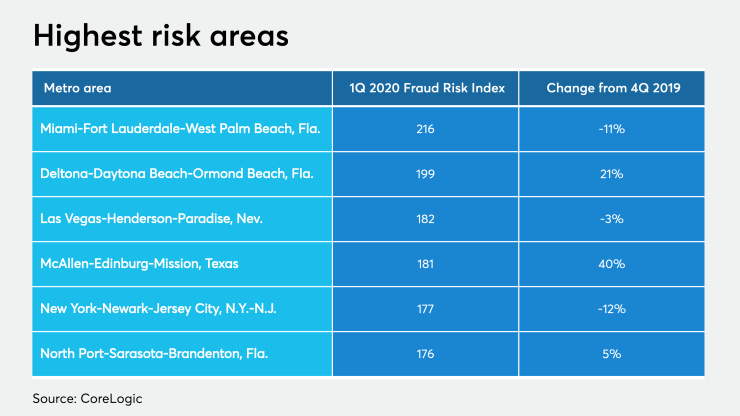The risk for mortgage application fraud fell 8.9% in the opening quarter of 2020 from the prior quarter and 26.6% from the same period last year. The latest risk level runs similarly to the last refinance boom of this magnitude in the third quarter of 2016, according to CoreLogic's National Mortgage Application Fraud Risk Index.
In the

But the effects of the coronavirus could bring an added cycle of fraud activity based on how home prices behave, the study warned.
"The immediate risk is borrowers misrepresenting income status. As new underwriting accommodations are introduced, such as flexibilities in appraisals and other verifications, some people will likely take advantage of the relaxed standards to inflate property values and falsify income and assets. Longer-term risks are dependent on the level of stress in the real estate market," Bridget Berg, principal of mortgage fraud solutions
"If prices fall, properties are difficult to sell, or there is a large increase in distressed inventory, expect to see builder bailout schemes, straw buyers, and illegal flipping," she added. "Much later in the cycle, fraud may increase in loan modifications, short sales and foreclosure rescue schemes. In addition, liquidity issues at financial institutions can trigger corporate schemes such as warehouse fraud, air loans, and misuse of custodial or trust accounts."
The study's index scores the collective level of risk using CoreLogic's LoanSafe Fraud Manager based on the share of high-risk loan applications with a baseline of 100. The index has no defined limit and ranged from 100 to 152 since inception in the third quarter of 2010.
So, the overall mortgage fraud index declined to 112 in the first quarter of 2020 from 123 quarter-over-quarter and 152 the year before.
Broken down by the highest risk metro areas, Florida accounted for seven of the top 15, with six in the top 10. The Miami-Fort Lauderdale-West Palm Beach, Fla., core-based statistical area led with an index score of 216 despite seeing a quarterly drop of 11% in mortgage fraud risk. The Deltona-Daytona Beach-Ormond Beach, Fla., reached an index score of 199 behind a 21% jump from the fourth quarter of 2019.
The Las Vegas-Henderson-Paradise, Nev., conglomerate came third with a score of 182, trailed closely by McAllen-Edinburg-Mission, Texas at 181. The Texas trio saw a 40% rise in fraud risk from the last quarter, the largest increase of any area in the top 15.
To help improve its offering and mitigate potential loss, CoreLogic teamed with Secure Insight in March to provide settlement agents with information to combat wire fraud.
"Incidents of wire fraud during the settlement process can not only derail a loan closing, but they can also lead to millions of dollars in losses for lenders," Cres Hay, senior leader of fraud solutions at CoreLogic, said in a press release. "The inclusion of detailed settlement agent data from Secure Insight allows LoanSafe users to screen settlement agents before closing to spot potential issues."





